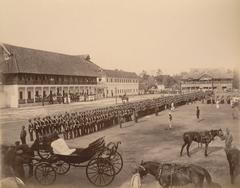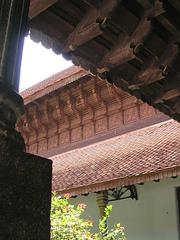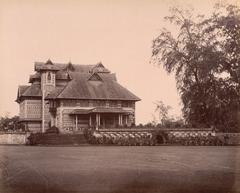Visiting Attukal Devi Temple: Hours, Tickets, and History
Date: 17/07/2024
Contents
- Introduction
- Historical Background
- Architectural Features
- Sanctum Sanctorum (Sreekovil)
- Gopuram
- Mandapam
- Outer Structures
- Unique Architectural Elements
- Murals and Frescoes
- Stone Carvings
- Wooden Sculptures
- Preservation and Renovation
- Visiting Hours and Tickets
- Travel Tips
- Cultural Significance
- FAQ
- Conclusion
Introduction
Nestled in the heart of Thiruvananthapuram, Kerala, the Attukal Devi Temple stands as a beacon of spiritual devotion and architectural splendor. This revered shrine, dedicated to Goddess Bhadrakali, attracts millions of devotees each year, particularly during the world-famous Attukal Pongala festival. In this guide, we’ll explore the temple’s rich history, stunning architecture, visiting hours, ticket information, and more.
Historical Background
The Attukal Devi Temple, located in Thiruvananthapuram, Kerala, India, is a revered shrine dedicated to Goddess Bhadrakali, an incarnation of Goddess Parvati. The temple’s history is deeply intertwined with local legends and folklore. According to one popular legend, the temple was established after the Goddess appeared in the dreams of a local chieftain and instructed him to build a shrine at the site. This divine intervention is believed to have occurred several centuries ago, although the exact date remains uncertain.
The temple gained prominence over the years, especially due to its association with the Attukal Pongala festival, which has been recognized by the Guinness World Records for the largest gathering of women for a religious activity (The Hindu). The festival involves the offering of Pongala (a sweet dish made of rice, jaggery, and coconut) to the Goddess and attracts millions of devotees annually.
Architectural Features
The architecture of the Attukal Devi Temple is a splendid example of traditional Kerala temple architecture, characterized by its intricate woodwork, stone carvings, and the use of natural materials. The temple complex is adorned with several structures, each with its unique architectural elements.
Sanctum Sanctorum (Sreekovil)
The sanctum sanctorum, or Sreekovil, is the most sacred part of the temple where the main deity, Goddess Bhadrakali, is enshrined. The Sreekovil is constructed in the traditional Kerala style, featuring a square-shaped structure with a conical roof made of copper sheets. The walls of the Sreekovil are adorned with exquisite carvings depicting various deities and mythological scenes.
Gopuram
The temple’s entrance is marked by a majestic gopuram (gateway tower), which is a common feature in South Indian temples. The gopuram at Attukal Devi Temple is relatively modest in height but is richly decorated with sculptures and motifs. The tower is divided into multiple tiers, each adorned with intricate carvings of gods, goddesses, and mythical creatures.
Mandapam
The mandapam, or prayer hall, is another significant architectural feature of the temple. It is an open pavilion supported by intricately carved wooden pillars. The roof of the mandapam is made of terracotta tiles, and the ceiling is adorned with beautiful murals depicting scenes from Hindu mythology. The mandapam serves as a gathering place for devotees during various rituals and ceremonies.
Outer Structures
The temple complex also includes several smaller shrines dedicated to various deities, including Lord Ganesha, Lord Shiva, and Lord Ayyappa. These shrines are constructed in a similar architectural style, maintaining the overall aesthetic harmony of the temple complex. Additionally, there are several sacred trees and a temple pond, which are integral to the temple’s spiritual ambiance.
Unique Architectural Elements
Murals and Frescoes
One of the most striking features of the Attukal Devi Temple is its collection of murals and frescoes. These artworks, which adorn the walls and ceilings of the temple, depict various episodes from Hindu mythology, including the stories of Goddess Bhadrakali, Lord Shiva, and Lord Vishnu. The vibrant colors and intricate details of these murals are a testament to the skill and craftsmanship of the local artisans.
Stone Carvings
The temple is also renowned for its elaborate stone carvings, which can be found on the walls, pillars, and gopuram. These carvings include depictions of deities, celestial beings, and mythical creatures, as well as intricate floral and geometric patterns. The stone carvings not only enhance the aesthetic appeal of the temple but also serve as a medium for conveying religious and mythological narratives.
Wooden Sculptures
Wooden sculptures are another prominent feature of the temple’s architecture. The wooden pillars and beams of the mandapam and other structures are adorned with finely carved sculptures of gods, goddesses, and mythical figures. These sculptures are crafted from high-quality timber and are meticulously detailed, reflecting the rich tradition of wood carving in Kerala.
Preservation and Renovation
Over the years, the Attukal Devi Temple has undergone several phases of renovation and restoration to preserve its architectural heritage and accommodate the growing number of devotees. The temple authorities have made concerted efforts to maintain the traditional architectural style while incorporating modern amenities for the convenience of visitors.
In recent years, the temple has also embraced sustainable practices, such as the use of eco-friendly materials and energy-efficient lighting, to minimize its environmental impact. These initiatives have been well-received by the local community and have set a positive example for other religious institutions in the region.
Visiting Hours and Tickets
For those planning to visit, the Attukal Devi Temple is open from 4:30 AM to 8:30 PM daily. There is no entry fee for devotees, but offerings and donations are welcome. During the Attukal Pongala festival, special arrangements are made to accommodate the influx of visitors, and it’s advisable to arrive early to partake in the rituals.
Travel Tips
- Best Time to Visit: While the temple is open year-round, visiting during the Attukal Pongala festival offers a unique and vibrant experience.
- Accessibility: The temple is accessible by road, with ample parking facilities available. The nearest airport is Trivandrum International Airport, and the nearest railway station is Thiruvananthapuram Central.
- Nearby Attractions: Combine your visit with nearby attractions such as the Padmanabhaswamy Temple, Kovalam Beach, and the Napier Museum.
Cultural Significance
The Attukal Devi Temple is not only an architectural marvel but also a cultural hub that plays a vital role in the social and religious life of the local community. The temple’s festivals, rituals, and ceremonies attract devotees from all over the world, fostering a sense of unity and spiritual devotion.
The temple’s association with the Attukal Pongala festival, in particular, has elevated its status as a major pilgrimage site. The festival, celebrated with great fervor and enthusiasm, showcases the rich cultural heritage of Kerala and highlights the important role of women in religious and social activities (Times of India).
FAQ
- What are the visiting hours of Attukal Devi Temple? The temple is open from 4:30 AM to 8:30 PM daily.
- How to get tickets for Attukal Pongala festival? There are no tickets required, but arriving early is recommended due to the large number of devotees.
- Where is Attukal Devi Temple located? It is located in Thiruvananthapuram, Kerala, India.
- What are nearby attractions? Nearby attractions include Padmanabhaswamy Temple, Kovalam Beach, and the Napier Museum.
Conclusion
The Attukal Devi Temple stands as a testament to the rich architectural and cultural heritage of Kerala. Its intricate design, historical significance, and vibrant cultural traditions make it a must-visit destination for anyone interested in exploring the spiritual and architectural wonders of India. For more information, you can visit the official website of Attukal Devi Temple.
Sources and Further Reading
- The Hindu - Attukal Pongala 2019
- Times of India - Attukal Pongala 2023
- Attukal Devi Temple Official Website





